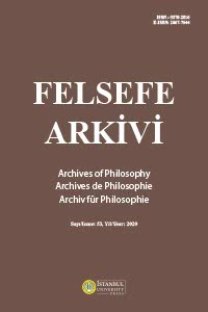Platon’un Ruh (Psykhē) Anlayışı
Bu çalışmanın amacı, Platon’un ruh (psykhē) anlayışına konuyla ilgili metinleri çerçevesinde bir çözümleme sunmaktır. Bu doğrultuda, öncelikle Platon’un ruh anlayışını evren tasavvurunun içine örgülediği vurgulanacak, bu nedenle doğrudan doğruya bu meselenin işlendiği Timaios diyaloğu ele alınıp orada tartışılan “cismani evrenin yaratılışı,” “evrenin ruhunun (psykhē pantos) teşkili” ve “evrenin ruhunun mayasından diğer ruhların yaratılışı” gibi konular irdelenecek, ayrıca bu süreçte zanaatkâr bir tanrı olarak Dēmiourgos ve diğer tanrıların üstlendiği rol üzerinde durulacaktır. Ardından Dēmiourgos’un evrenin ruhundan arta kalanlarla yarattığı ölümsüz ruha karşılık, diğer tanrıların eliyle şekillenen ölümlü ruhun mahiyeti incelenecektir. Bu bağlamda ölümsüz ruh ile ölümlü ruh veya beden arasındaki ilişki tartışmaya açılarak ruhun “akıl” (to logistikon), “heyecan” (to thymoeides) ve “iştah” (to epithymētikon) şeklinde adlandırılan bölümleri veya işlevleri açıklanacaktır. Ruhun bedenlenip cismani evrene inişi ve bu bedenlenme sürecinde söz konusu temel işlevlerinin bedenin hangi bölgelerinde konumlandırıldığı, yine Timaios diyaloğu ışığında gösterilmeye çalışılacaktır. Daha sonra ruhun üç bölümlü veya üç işlevli yapısı, Phaidros diyaloğunda işlenen “kanatlı at” mitosuyla örneklendirilecek, bu sayede ruhun bedenlenme sürecine ve bedenlenmeden önceki semavi yaşayışına, başka deyişle göğün üstünde bir mekânda (hyperouranion topon) yer alan idea’lar âlemini temaşa etme (theōria) anına ışık tutulacaktır. Böylelikle hem Timaios hem de Phaidros diyaloglarında yer alan anlatımlar birbiriyle ilişkilendirilerek Platon’un ruh anlayışı açıklığa kavuşturulacak; sonuç olarak Platon’a göre ruhun hakiki âlem ile bu dünya arasındaki bağlantıyı tesis edebilme imkânına sahip bir varlık olduğu, bu nedenle onun varlık ve bilgi anlayışının düğüm noktasını oluşturduğu ortaya konmaya çalışılacaktır.
Plato’s Concept of Soul (Psykhē)
The aim of this study is to present an analysis of Plato’s view of soul (psykhē) within the framework of his extant works on this matter. In this regard, Plato’s view of soul is emphasized to be woven into his cosmological theory. Therefore, this study will examine in detail the Timaeus dialogue in which this issue is discussed and scrutinize the subjects treated in this work such as the creation of the corporeal universe, the formation of the World-soul (psykhē pantos), and the creation of other souls from the nature of the World-soul. Then the study will clarify the role of Demiurge as a craftsman as well as the roles of the other gods in this process, after which the nature of the mortal soul formed by the other gods apart from the immortal soul Demiurge had created with the remains of the World-soul will be analyzed. In this context, the study will question the relationship between the immortal and the mortal soul and explain the parts or functions of the soul known as the logistikon [reason], the thymoeides [spirit], and the epithymētikon [appetite]. Again, the study will attempt to show in light of Timaeus the embodiment of the soul, its descent to the corporal universe, and where in the body its aforementioned functions are located in this process. Next, the study will exemplify the three-part/functional nature of the soul through the myth of the winged soul in Phaedrus and by this means shed light on the process of the soul’s embodiment and celestial life before being embodied, namely the moment of the contemplation (theōria) of the realm of Ideas located in a region above the heavens (hyperouranion topon). Thus, the study will relate the narrations in Timaeus and Phaedrus to one another and clarify Plato’s view of the soul. As a result, the study will try to show that the soul according to Plato is a living being with the ability to establish connections between the realm of ideas and this world and that this therefore constitutes a vital point regarding Plato’s understanding of being and knowledge.
___
- Bett, Richard. “Immortality and the Nature of the Soul in the Phaedrus.” Editör Ellen Wagner, 335-365. Oxford: Lexington Books, 2001. google scholar
- Burnet, Ioannes. Platonis Opera. Tomus 2, Tetralogia III: Parmenides, Philebus, Symposium, Phaedrus. Oxonii: E Typographeo Clarendoniano, 1907. google scholar
- Burnet, Ioannes. Platonis Opera. Tomus 4, Tetralogia VIII: Clitopho, Respublica, Timaeus, Critias. Oxonii: E Typographeo Clarendoniano, 1907. google scholar
- Cornford, Francis MacDonald. Plato’s Cosmology: The Timaeus of Plato. Indianapolis/ Cambridge: Hackett Publishing Company, 1997. google scholar
- Dürüşken, Çiğdem, Antikçağ Felsefesi: Homeros’tan Augustinus’a Bir Düşünce Serüveni. İstanbul: Alfa Yayınları, 2014. google scholar
- Dürüşken, Çiğdem. “Antikçağda ‘Psykhe’ Kavramına Genel Bir Bakış I.” Felsefe Arkivi 29 (1994): 75-85. google scholar
- Lorenz, Hendrik. “Plato on the Soul.” The Oxford Handbook of Plato. Editör G. Fine, 507-529. Oxford: Oxford University Press, 2019. google scholar
- Peters, Francis. Greek Philosophical Terms. A Historical Lexicon. New York: New York University Press, 1967. google scholar
- Roberts, Eric. “Plato’s View of the Soul,” Mind 14 (1905): 371-389. google scholar
- Robinson, James. “The Tripartite Soul in the ‘Timaeus’.” Phronesis 35/1 (1990): 103-110. google scholar
- Rohde, Erwin. Psyche: The Cult of Souls and Belief in Immortality among the Greeks. London: Kegan Paul, 1925. google scholar
- Solmsen, Friedrich. “Plato and the Concept of the Soul (Psyche): Some Historical Perspectives.” Journal of the History of Ideas 44/3 (1983): 355-367. google scholar
- Taylor, A.E. A Commentary on Plato’s Timaeus. Oxford: Clarendon Press, 1928. google scholar
- Waterfield, Robin. Plato: Timaeus and Critias. Oxford: Oxford University Press, 2008. google scholar
- Yunis, Harvey. Plato. Phaedrus. Cambridge: Cambridge University Press, 2011. google scholar
- Zeller, Eduard. Plato and the Older Academy. Çeviren Sarah Frances Alleyne ve Alfred Goodwin. London: Longmans, Green, and Co., 1876. google scholar
- Zeyl, Donald J. Encyclopedia of Classical Philosophy. London and New York: Routledge, 1997. google scholar
